My
Life to Live (Vivre Sa Vie)
1962
Director: Jean-Luc Godard
Starring: Anna Karina, Sady Rebbot
My
Life to Live
is an early yet wholly realized entry by Godard in the French New Wave
style. I’m not really a fan of the
French New Wave, and I’m definitely not really a fan of Godard, but I find My
Life to Live rather captivating.
It’s Godard before Godard went off the cinematic deep end, and honestly,
if I had to recommend a film to start Godard’s repertoire with, it would be
this one.
Told
in twelve distinct tableaux, each with their own oddly antiquated title card, My
Life to Live is about the young Parisian woman Nana, an aspiring
actress. Nana (Karina) opens the film by
breaking up with her boyfriend, Paul, but he was helping to support her; her
job at a record store doesn’t pay her well enough, and on her own, she soon
descends into prostitution. A run-in
with an old friend who is also a prostitute introduces her to a pimp Raoul
(Rebbot) and she all too easily seems to adjust to “The Life” (part of a play
on the title of the film). In parts of
certain episodes, she acts happy, but it doesn’t take a stretch of the imagination
to realize she isn’t, and Nana’s doomed existence seems a matter of fact.
Godard
was married to Karina when he filmed My Life to Live, and I think it
shows. The way the camera moves around
Nana, chronicling her life through her viewpoint, and yet always somehow
exhibiting Karina’s almost alien-esque beauty is a sign of this. We get so many shots of her eyes, her mouth,
her smile, her dark hair, her lithe frame, her profile. Karina is luminous in this film, and I think
I’m a little entranced by her here. The
camera is too, as it slowly pans back and forth, watching her as she talks to
her pimp, or slowly zooms in and out on her face as she is talking to a
friend.
Speaking
of the camera, there is an odd lack of faces in this film. Take the opening scene where Nana breaks up
with Paul. The two are sitting at the
counter in a café, but they are shot from behind. We can see Nana’s face reflected in the
mirror behind the counter only slightly, but we have no such reflection of
Paul. Nana’s head moves, we know she is
speaking, but the voice that answers her is almost disembodied. Other characters in the film get similar
treatment. Nana listens to her friend
recount how she started in prostitution, but it is about Nana listening and not
the friend, as we rarely see her during this conversation. Godard foregoes two-shots in favor of clearly
focusing on Karina as much as possible.
When we do occasionally see the full face of another character, it is
brief and almost surprising because we have gotten used to the backs of
heads.
Significantly,
the one character who gets the most face time in the film is an “extra,” French
philosopher Brice Parain. Nana strikes
up a conversation with him in a café when she is well-ensconced in her career
of prostitution, but she quickly moves from trying to hit on him to simply
discussing life with him. In this
conversation, we focus far more on Parain, who talks about thought and life and
love and age, with Nana only occasionally joining in. Because the camera focuses so much on Parain,
perhaps this is saying that this man, this conversation, is one of the few
moments in her life where Nana can focus on something other than herself. Perhaps the camera focuses so squarely on
Nana, to the extent of even blocking out other characters, in the rest of the
film to show Nana’s self-centered nature.
But here, in this conversation, she is entirely present and paying
attention to what someone else has to say.
It’s a significant moment for both her and the film, as it precipitates a
change in her approach to prostitution.
After this conversation, sad Nana tries to break free from The Life, an
attempt that clearly spells her doom.
The
music is an interesting choice in My Life to Live, and just another
example of Godard’s philosophy that film should be self-aware. There is a beautiful and incredibly sad
sixteen bar theme that was written for the film, but that is the only piece of
soundtrack score we ever hear.
Occasionally it repeats and we hear it for more than a minute or so, but
most of the time it comes in and simply plays the sixteen bars, then stops just
as abruptly as it starts. We expect
more, we want more, but Godard reminds us this is a score and not actually part
of the events taking place on the screen, so why should it extend the length of
the scene? I really hesitate to even
call it a score or soundtrack, but it is a very lovely theme for a film.
Prostitution
is treated with tremendous alienation in My Life to Live, essentially
mirroring how Nana feels about what she’s doing. In the coldest segment of the film, Nana asks
her pimp what “the rules” are regarding rooms, hours, fees, police regulation,
and even abortions. It’s downright clinical,
and through what is easily the shortest of the twelve parts of the film, Nana descends
wholly into her “life.” The sex is
clearly not shown (this is 1962 after all), and there is no glamour. Just as the Paris we see is littered and
cheap, the sex is cold, almost utilitarian.
There is no titillation about Nana’s profession, but neither is there a
sense of yawning depression about her lot.
It’s simply there, a banal, boring fact of Nana’s life.
As
Nana is the clear focal character of the film, it’s odd that although I like
her, I don’t love her, nor do I feel much sympathy for her, and yet that
doesn’t stop me from rooting for her.
Her life descends quickly at the beginning of the film into her
situation, but she is also a bit cold and cruel. When she breaks up with Paul in the opening
scene, she’s downright awful, and it’s a bit disconcerting how quickly she
seems to adjust to prostitution. Is she
likeable? I’m really not sure. And yet, on her side, she is moved to tears
at the cinema by an intense scene from The Passion of Joan of Arc, she is
fascinated with the philosopher, and despite her headstrongness taking her into
the existence it did, she does not deserve her doom. To me, the final two “chapters” of the film
make up its emotional crux. Nana starts
to awaken from her existential stupor, but just as she does, she is stricken
down by the trappings around her, bound to the life she has unwittingly buried
herself in. It’s tragic, it really is.
Accessible
in terms of a straightforward narrative yet inventive in terms of film
philosophy without being absolutely insane, My Life to Live is a good
starting place for Godard.
Arbitrary
Rating: 8/10
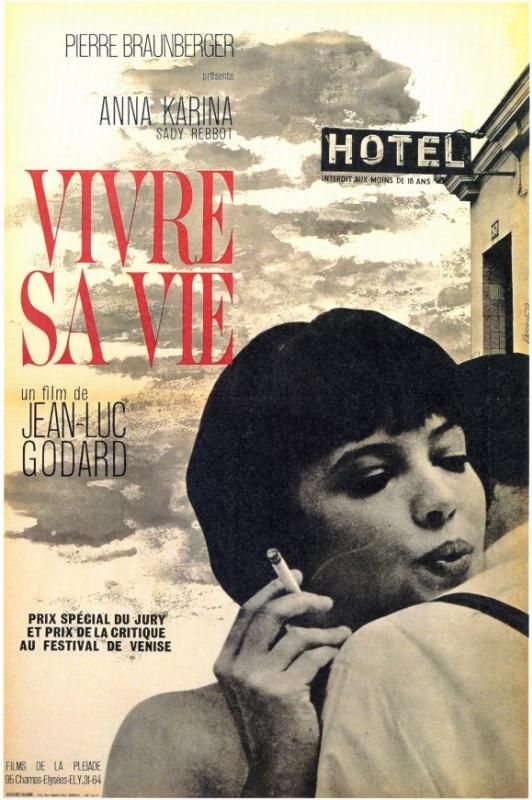
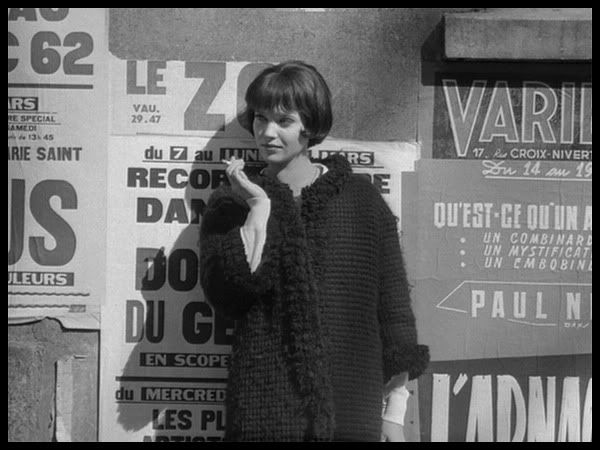
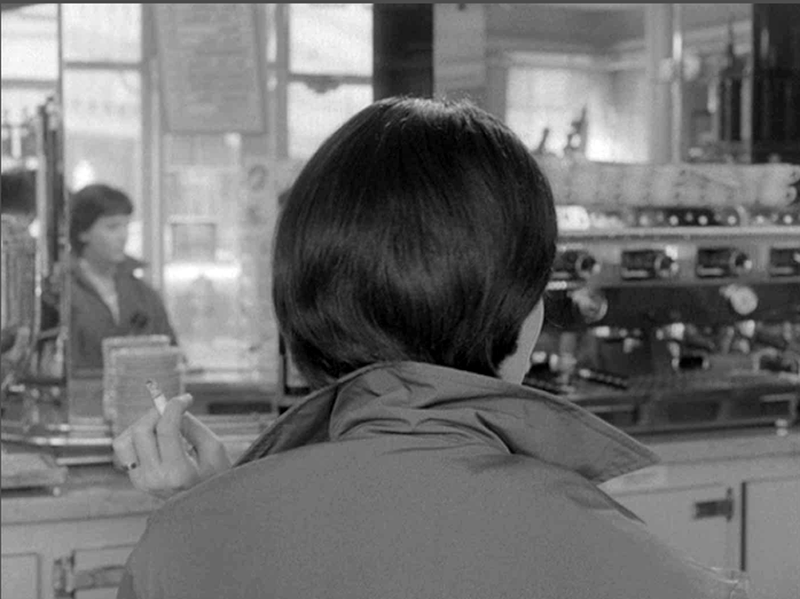
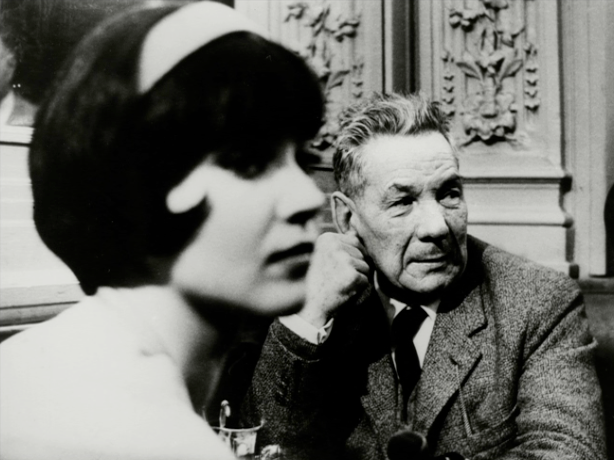
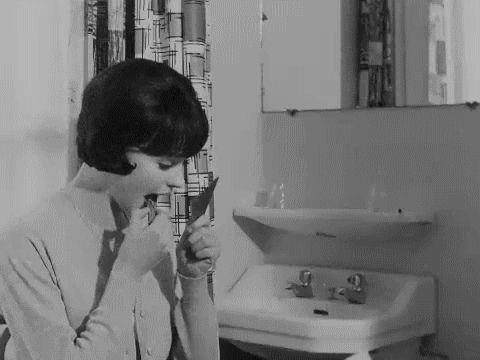
I just watched this five days ago. I'm not sure if you read my comments on Letterboxd, so I will repeat them here:
ReplyDeleteThe reason to see this film is Anna Karina as the main character of Nana. Unfortunately, Godard thinks he's the star and we should want to watch him play with various, really distracting camera techniques instead of paying attention to the story. He does things like shoot scenes where all you see are the backs of people's heads while they are talking.
Even then this is still a good movie following Nana. Again, unfortunately Godard only seems to have a good hour in him for some of his films before he loses his way and that applies to this one, too. The final 20 minutes of the film almost sinks it. First he has an almost 15 minute long random conversation between Nana and a philosopher that just grinds the movie to a halt, then he tacks on an "immoral people must pay for their sins" scene that doesn't really fit with the rest of the film.
Despite all this there is still much to enjoy from Anna Karina's performance, especially the change in her body language when she becomes more comfortable with what she is doing. She has some cute little touches, too, like when she quickly measures herself from head to toe with her hand.
One final note: apparently what Nana wants to do with her life is smoke a ton of cigarettes. There is hardle a single shot in the movie where she is not sucking on a cigarette, lighting one up, or exhaling smoke. This movie would be a smoking fetishist's dream. Unfortunately for me, I have whatever the opposite of a smoking fetish is; it's a huge turnoff for me when a woman smokes.
Ha ha! Well, I definitely agree about Karina here. She's magnetic.
DeleteAnd as for Godard, I think I've just started accepting his incredibly idiosyncratic methods of shooting a movie. Dude definitely played by his own rules. Does that make him good? Can't say, but I've accepted it. I don't ever expect a traditional movie with Godard, and I had to rewatch "Week End" with the commentary on because it was the only way I could make sense of the story (it wound up helping quite a bit).
I actually thought giving us so many shots of other people's backs of heads let me focus more on Nana and her story, but I also get your point.
replica bags wholesale hong kong replica kipling bags replica bags aaa
ReplyDeletea0u98d8g66 l2e22x9b07 h2f98y2u94 b0y90c0r98 x3v31s9d07 n3b50l4q23
ReplyDelete